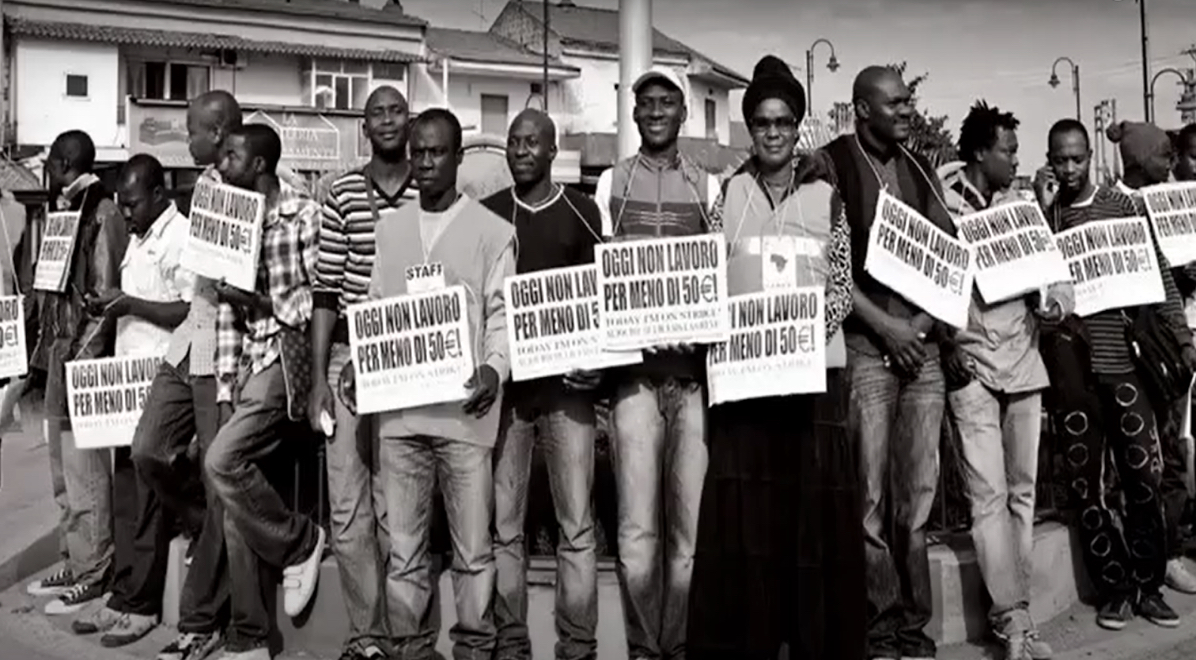
11 Dec First DignityFIRM documentary: Mamadou Kouassi Pli Adama, the struggle of migration
by Irene Palla
DignityFIRM’s contribution to the documentary Mamadou Kouassi Pli Adama: la lotta della migrazione
We at DignityFIRM are proud to have participated in creating the documentary Mamadou Kouassi Pli Adama: la lotta della migrazione, directed by Andrea Fantino in collaboration with FIERI. The documentary is now available for viewing on our YouTube channel, and we encourage you to watch it, share it, and use it as a resource for discussions or educational purposes. We’d love to hear your thoughts on the film—how have you used it, and what impact did it have on you? Don’t hesitate to reach out and let us know your feedback!
What is the documentary about?
The documentary Mamadou Kouassi Pli Adama: la lotta della migrazione follows the journey of Mamadou Kouassi Pli Adama, a migrant from Côte d’Ivoire who has crossed multiple borders in search of a better life. From his homeland to the Libyan desert, the Sicilian Channel, Lampedusa, Rome, Castelvolturno, and beyond, Mamadou’s story paints a vivid picture of the migrant experience in Italy. His journey exposes the brutal reality of migrant labour, exploitation, and the harsh conditions faced by Sub-Saharan Africans working in the country.
Through Mamadou’s eyes, we see the ongoing struggle of migrants in Italy, from tobacco fields in Caserta to orange groves in Rosarno, where the notorious “caporalato” system (worker exploitation through illegal middlemen) thrives. Despite these hardships, Mamadou’s determination and resistance shine through as he takes part in protests and becomes an outspoken advocate for migrant rights.
Mamadou’s story: a powerful voice for change
Mamadou Kouassi Pli Adama’s journey is not just one of physical migration but also a fight for justice. After surviving violent exploitation and discrimination, Mamadou found refuge in Italy, receiving humanitarian asylum, an exception that underscores the precarious situation of migrants in Italy. His voice, now a symbol of resistance, has become an essential part of the conversation on migration reform.
Mamadou’s involvement in the 2010 migrant rebellion in Rosarno and subsequent escape from violent persecution marked the beginning of his active role in advocating for migrant workers’ rights. He later became the spokesperson for the Refugee and Migrant Movement in Caserta, fighting for better living and working conditions for those like him.
Today, Mamadou continues to raise his voice against injustice, and his commitment to challenging Italy and Europe’s migration policies is unwavering. His collaboration with filmmaker Matteo Garrone on the movie Io Capitano has given him further platforms to call for meaningful change, urging the world to address migration issues with the seriousness they deserve.
Andrea Fantino’s vision: why migrations matter
So, how did Andrea Fantino, the director of this compelling documentary, come to focus on migrations? Andrea’s background as a cultural anthropologist deeply influenced his filmmaking approach, allowing him to understand the nuances of migrant life from a human perspective.
Before becoming a filmmaker, Andrea dedicated years to researching the refugee experience, especially focusing on Sudanese refugees from Darfur. His academic work, including his thesis on the political ethnography of refugees in Turin, laid the foundation for his future documentaries. Andrea’s fascination with human migration evolved over time. Andrea’s filmmaking journey reflects his commitment to telling stories that highlight the struggles of marginalized communities. His documentaries, like Mamadou Kouassi Pli Adama: La Lotta della Migrazione, aim to shed light on migrants’ lived experiences, giving them a platform to be heard and understood beyond statistics and media stereotypes. It is important to emphasize the longstanding collaboration between Andrea and FIERI, which is driven by FIERI’s efforts to bridge research and multimedia production. They have previously worked together on Horizon 2020 projects such as TRAFIG, with Il mio posto è qui? Vivere da rifugiati in Italia, and Whole-COMM, with Navigating Diversity: Building Community Amidst Change in Cuneo.
About the director: Andrea Fantino
Andrea Fantino is a cultural anthropologist and documentary filmmaker based in Roccavione (CN), Italy. His passion for anthropology and film has led him to create powerful documentaries that explore complex social issues, particularly those affecting marginalized groups. Andrea’s work spans themes such as migration, refugees, linguistic minorities, and social justice.
Andrea’s documentary career began after studying cultural anthropology at the University of Turin, where he worked closely with refugees from Sudan and Somalia, documenting their experiences. As a filmmaker, he is known for his ability to create intimate, impactful stories that resonate with audiences.His notable works include Climbing Walls, Making Bridges, I balerin del Bal Veij, Transumare, and Il mio posto è qui? Vivere da rifugiati in Italia. Andrea’s documentaries have earned him numerous accolades, including special mentions at the Potenza Film Festival (2022) and Valsusa Filmfest (2024) for The voice of those who have no voice. That is a documentary about CoroMoro, a choir of African asylum seekers who sing songs in the Piedmontese dialect from the Lanzo Valleys and which over the years have become a real laboratory of integration and coexistence.